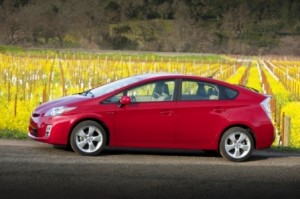
A seemingly endless stream of recalls by Toyota meant 2010 saw more safety-related recalls than any year since 2004.
The following story has been revised to reflect the latest recalls announced New Year’s Eve by two Detroit automakers.
Driven by a series of massive safety-related actions at Toyota, the number of vehicles recalled in the U.S., this past year will have reached near-record levels.
But Toyota wasn’t alone, as two of Detroit’s Big Three demonstrated, collectively announcing the recall of another 165,000 vehicles during the final hours of 2011.
Still, were it not for the Japanese maker’s multiple problems, the number of recalls in 2010 would have come in at less than half of the previous record, the 30.8 million vehicles involved in safety-related recalls back in 2004. As it stands, an analysis by the Associated Press shows that about 20 million cars, trucks and crossover will have been impacted in 2010 the highest figure since the industry set that record, six years ago.
It’s not clear whether that means there has been a sudden and unexpected setback in the effort to improve automotive quality, reliability and safety. Particularly in the light of Toyota’s problems, government regulators have ramped up their own efforts – partly because internal Toyota documents suggested the National Highway Traffic Safety Administration may have become too cozy with the auto industry.
Automakers themselves, meanwhile, have become more sensitive to potential problems – fearing both the wrath of regulators and the potential harm to their public image should they be seen as also dragging their heels on resolving safety issues.
That may be the biggest problem of all for Toyota which, earlier this month, agreed to pay a record $32.4 million in fines, closing two NHTSA investigations involving delayed recalls. The Japanese maker paid a previously record $16.4 million fine for a similar delay earlier in the year.
All told, the maker has called back 7.1 million vehicles in the U.S. – bringing its global total to 11 million – this year. And that doesn’t include millions more recalled late in 2009 for the first action meant to resolve problems with sudden acceleration.
While that issue led to the majority of Toyota’s recall problems, the maker also had to deal with other problems, ranging from faulty brakes on the 2010 Prius hybrid to stalling Toyota Corollas. There were steering issues and excess corrosion problems severe enough for parts to fall off older Toyota minivans and pickups.
The Toyota scandal led to a series of angry and well-publicized hearings in Congress, earlier this year. In turn, Department of Transportation Secretary Ray LaHood promised to tighten the screws to make sure safety issues don’t go undetected. His agency was sorely embarrassed when a leaked Toyota document showed the maker bragging about having downsized an earlier sudden acceleration recall, saving it $100 million.
Lawmakers also promised to toughen safety standards though, as they headed home for the holidays, that was one of the unfinished items on their legislative agenda. It remains to be seen whether the topic will again be embraced on Capitol Hill after the Republicans take control of Congress next month.
The jump in recalls actually counters the trend towards improved quality and reliability. Various studies by J.D. Power and Associates and other third-party researchers, show that the typical vehicle now experiences about a third fewer “problems” than those that rolled out in 2004, when recalls peaked.
But there’s another trend that can result in significantly larger recalls once a safety issue is uncovered. In their effort to drive down costs, automakers are adopting a so-called platform strategy, using similar chasses and components for a wide range of vehicles.
That’s why millions of Toyotas – encompassing a wide range of different models — were recalled due to sticky accelerator pedals, last January. Ford has had similar issues due to the use of common – and faulty – ignition switches, while Honda has had a widespread problem with airbags.
Ford’s latest recall demonstrates how a small problem can spread from model to model. While the total is relatively small — just under 15,000 in the latest recall — it impacts 2011 Ford Edge crossovers and F-150 pickups, and Lincoln MKX models. Triggered by fires that started in unattended vehicles at the maker’s Dearborn Assembly Plant, Ford will inspect recalled vehicles for possible problems that could a body control module to short out.
Chrysler, meanwhile, is recalling 144,000 vehicles in three separate safety campaigns, including the 2009 Dodge Journey, 2011 Ram pickup and 2008 through 2011 Ram 4500 and 5500 trucks. Chrysler, which is struggling to reverse its own reputation for quality problems will end 2010 having recalled 1.6 million vehicles.
So, while the industry seems to be getting a better grip on quality and reducing the number of parts that prove defective, when there is a recall, it will often impact significant numbers of vehicles. And that trend isn’t likely to change.
